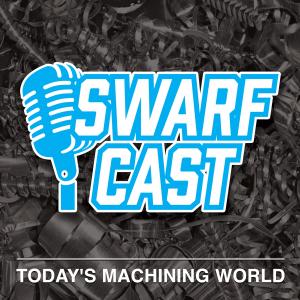Swarfcast

Ep. 100 – Looking back on 99 Episodes of Swarfcast
Today is a special occasion. It is the 100th episode of Swarfcast A lot has happened in our lives since the podcast began two and half years ago, and today we are going to look back at how the show reflected the world as it evolved. Scroll down to listen to the podcast. Or listen on your phone with Google Podcasts, Apple Podcasts or your favorite app. Main Points Noah talks about the podcast’s second episode, recorded in April of 2018, in which he interviewed Miles Free, Director of Industry Affairs of the Precision Machined Products Association (PMPA). He plays a clip in which Miles discusses how tariffs on metals punish American factory workers and consumers. He also talks about a Chinese law (at the time of the interview) that said any foreign company in China is required to have a Chinese partner that has full access to the company’s technology. Miles says China was relaxing this law for foreign car companies. (3:00) Noah shares thoughts about Episode 86, in which he interviewed Mike Micklewright, Director of the Kaizen Institute. Mike enthusiastically says that reshoring is happening, but he would not provide specific examples. Lloyd says he keeps hearing about the reshoring trend from machining business owners who are quoting jobs against China, but he has yet to see much proof of it actually happening yet. (5:45) Lloyd says that tariffs didn’t result in the immediate return of work from China, but they planted the seed for companies to analyze their relationships with Chinese suppliers. He says the pandemic dramatically changed how American businesses see working with China because it made the supply chain much less reliable. (7:15) Noah plays a clip from Episode 72 with Daniel Hearsch, Managing Director at Alex Partners, a global supply chain expert. Daniel gave his best and worst case predictions for the impact of COVID-19 on the manufacturing economy. Back in late February when the interview was recorded, Daniel felt in a best case scenario American businesses would feel pressure for 4-5 months, with the stock market also taking a hit and the government providing some intervention. However, he also describes a worst case scenario, where people don’t take the threat seriously and the virus spreads, leading to further shut downs and slowing of business in the longer term. He seemed to be predicting more of the best case scenario in the interview. (8:50)






 Visit Podcast Website
Visit Podcast Website RSS Podcast Feed
RSS Podcast Feed Subscribe
Subscribe
 Add to MyCast
Add to MyCast